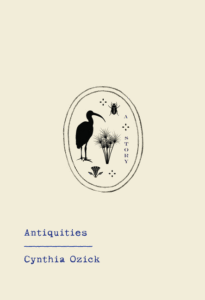
Our basket of brilliant reviews this week includes Alexandra Kleeman on Helen Oyeyemi’s Peaces, Helen Phillips on Jeff VanderMeer’s Hummingbird Salamander, Walton Muyumba on John Edgar Wideman’s You Made Me Love You, Giles Harvey on Cynthia Ozick’s Antiquities, and Pricilla Gilman on Haruki Murakami’s First Person Singular.
“In [Oyeyemi’s] hands, the realm of lore and the so-called ‘real world’ exert a gravitational pull on each other, resulting in unexpected amalgamations of Bluebeard and Yoruban folk tales, Tinder and talking dolls, and complex, unconventional characters who tug the trajectory of recognizable tales out of the ruts and grooves of a well-traveled road. With her newest novel, Oyeyemi ventures away from these familiar shapes, though not from the playful reinvention of genres and tropes … The first half of the novel borrows its momentum from the train itself, barreling forward toward an unknown destination of unknown import, lurching back and forth between the interiors of eccentrically decorated train cars and the playfully enigmatic interiorities of the characters. Oyeyemi is a master of leaps of thought and inference, of shifty velocity, and the story’s long setup has the discombobulating quality of walking through a moving vehicle while carrying a full-to-the-brim cup of very hot tea … The lure of real connection and real resolution, their transformative power turning an obscure object of pursuit into a steadfast counterpart, moves the cast of characters toward denouement in much the same way that a death motivates investigation in a locked-door murder mystery … at the book’s end the story lands more Patricia Highsmith than Agatha Christie: a maze of identity and desire that has an ending, but not a solution. Every piece of the puzzle falls into place, but the picture is never made whole. Perhaps this is Oyeyemi’s point: To be at peace with the vagaries of human connection, you have to learn to find the wholeness in every part.”
–Alexandra Kleeman on Helen Oyeyemi’s Peaces (The New York Times Book Review)
“Today’s pace of extinction is hundreds if not thousands of times greater than the natural extinction rate. Humans are, of course, profoundly implicated in this loss of life and biodiversity. Jeff VanderMeer’s 20th book, the ambitious ecological thriller Hummingbird Salamander, asks us to engage with this reality … This madcap mystery offers plenty of charms—a magnetic amateur gumshoe, clues hidden within more taxidermied animals, confrontations at used-car dealerships—but, ultimately, VanderMeer is getting at something much deeper and darker here … As Silvina’s sublime or unhinged master plan reveals itself, VanderMeer makes the case—viscerally, unflinchingly—that we would do well to envision ourselves at this existential inflection point alongside Jane, exploring possible destinies for life on our planet …Hummingbird Salamander, though less wildly inventive, is potent for being more familiar, far closer to our current reality. This is climate fiction at its most urgent and gripping.”
–Helen Phillips on Jeff VanderMeer’s Hummingbird Salamander (The New York Times Book Review)

“John Edgar Wideman has been my most important teacher, though I didn’t attend any of his courses … There is a long line of death, trauma, and violence—and silence about those terrors—in Wideman’s family history. The author has acknowledged and grappled with this barbed truth in his creative nonfiction. In his stories, Wideman doesn’t have space or time to explore causes, so he drills down to the effects, elaborating the emotional consequences for characters confronting their past or repeating subtle acts of violence through silence or passing on traumas generationally as though they are genetic material or inherited debt … No one in American letters sounds like Wideman. His unique, forceful musicality stems, in part, from his close study of blues idiom literature and lyricism … Wideman is, as great fiction writers often are, a serious, intense noticer of the minuscule, intimate details of human experience. And his characters and voices reflect that careful attention: they represent humans struggling with family legacies, endemic racism and injustice, and looping cycles of community violence and economic limitation. They also laugh, sing, dance, tell stories, philosophize, mourn their dead, celebrate their living, and create beauty. Wideman doesn’t write to essentialize Blackness; his stories represent Black experience as the very seat of the practices of possibility and freedom.”
–Walton Muyumba on John Edgar Wideman’s You Made Me Love You: Selected Stories, 1981-2018 (The New York Review of Books)

“Ozick has been a fervent critic of identity politics since the nineteen-seventies … and yet few have written so well about the inconstant self-esteem of the socially marginalized … A brisk work of some thirty thousand words, it explores her favorite subjects—envy and ambition, the moral peril of idolatry—in her favorite form. As you might expect, it also has much to say about last things, and the long perspectives open to the human mind as it approaches its terminus … It’s here, around the halfway point, that Ozick begins to move through the gears of her formidable imagination, introducing a tincture of magic to what has so far been a piece of fairly standard realism … Ozick’s book about a man ensnared by history is at once a warning against the hazards of nostalgia and an invitation to take a longer view of how we got to where we are. Transfixed by the unfolding spectacle of current events, the modern reader is apt to miss her richest and most subtle suggestion: that we have made an idol of the present.”
–Giles Harvey on Cynthia Ozick’s Antiquities (The New Yorker)
“… a blazing and brilliant return to form … a taut and tight, suspenseful and spellbinding, witty and wonderful group of eight stories … there isn’t a weak one in the bunch. The stories echo with Murakami’s preoccupations. Nostalgia and longing for the charged, evocative moments of young adulthood. Memory’s power and fragility; how identity forms from random decisions, ‘minor incidents,’ and chance encounters; the at once intransigent and fragile nature of the ‘self.’ Guilt, shame, and regret for mistakes made and people damaged by foolish or heartless choices. The power and potency of young love and the residual weight of fleeting erotic entanglements. Music’s power to make indelible impressions, elicit buried memories, connect otherwise very different people, and capture what words cannot. The themes become a kind of meter against which all the stories make their particular, chiming rhythms … The reading experience is unsettled by a pervasive blurring of the lines between fantasy and reality, dream and waking … Most of the narrators foreground the act of telling and ruminate on the intention behind and effects of disclosing secrets, putting inchoate impulses, fears, or yearnings into clear, logical prose … This mesmerizing collection would make a superb introduction to Murakami for anyone who hasn’t yet fallen under his spell; his legion of devoted fans will gobble it up and beg for more.”
–Pricilla Gilman on Haruki Murakami’s First Person Singular (The Boston Globe)

